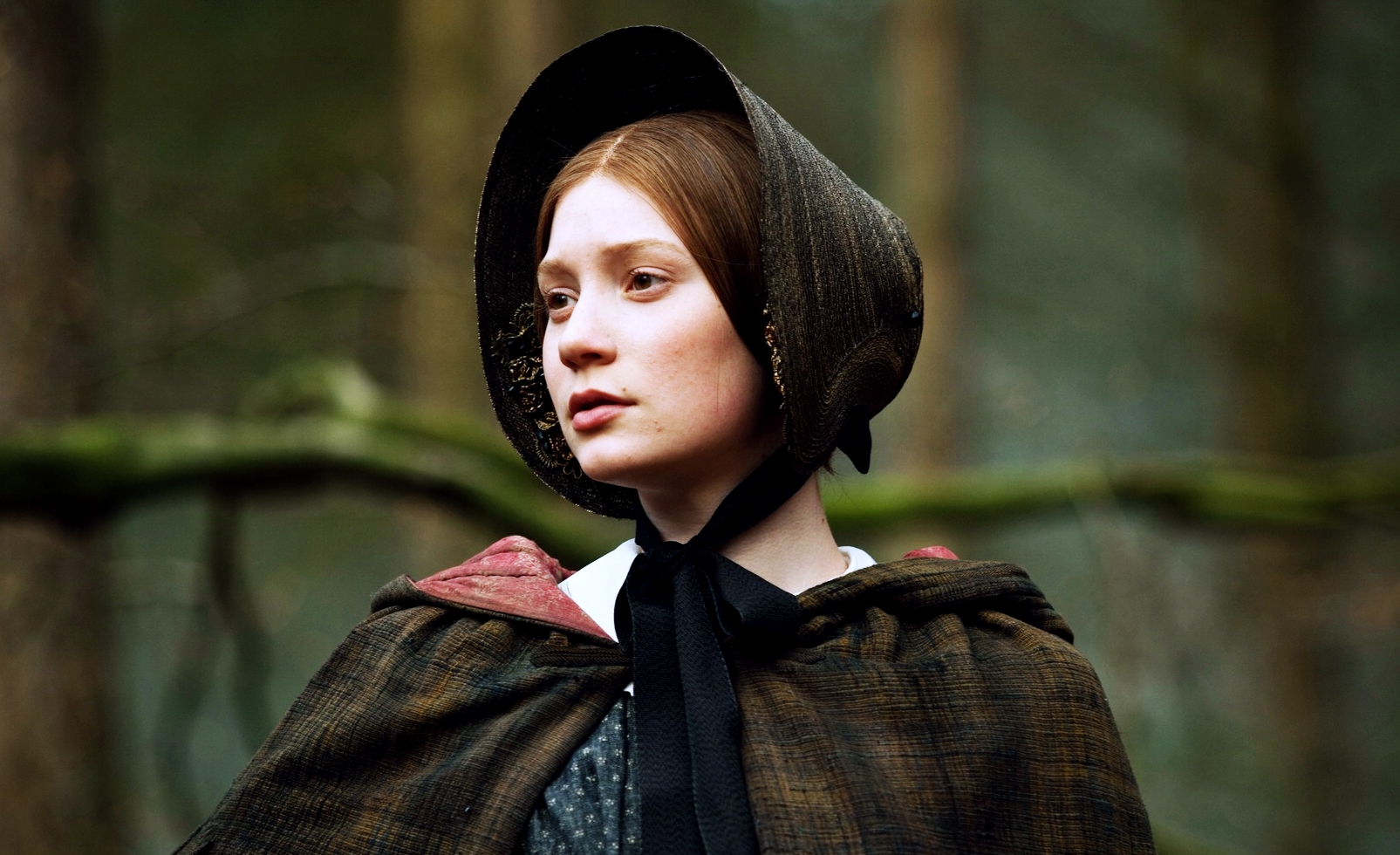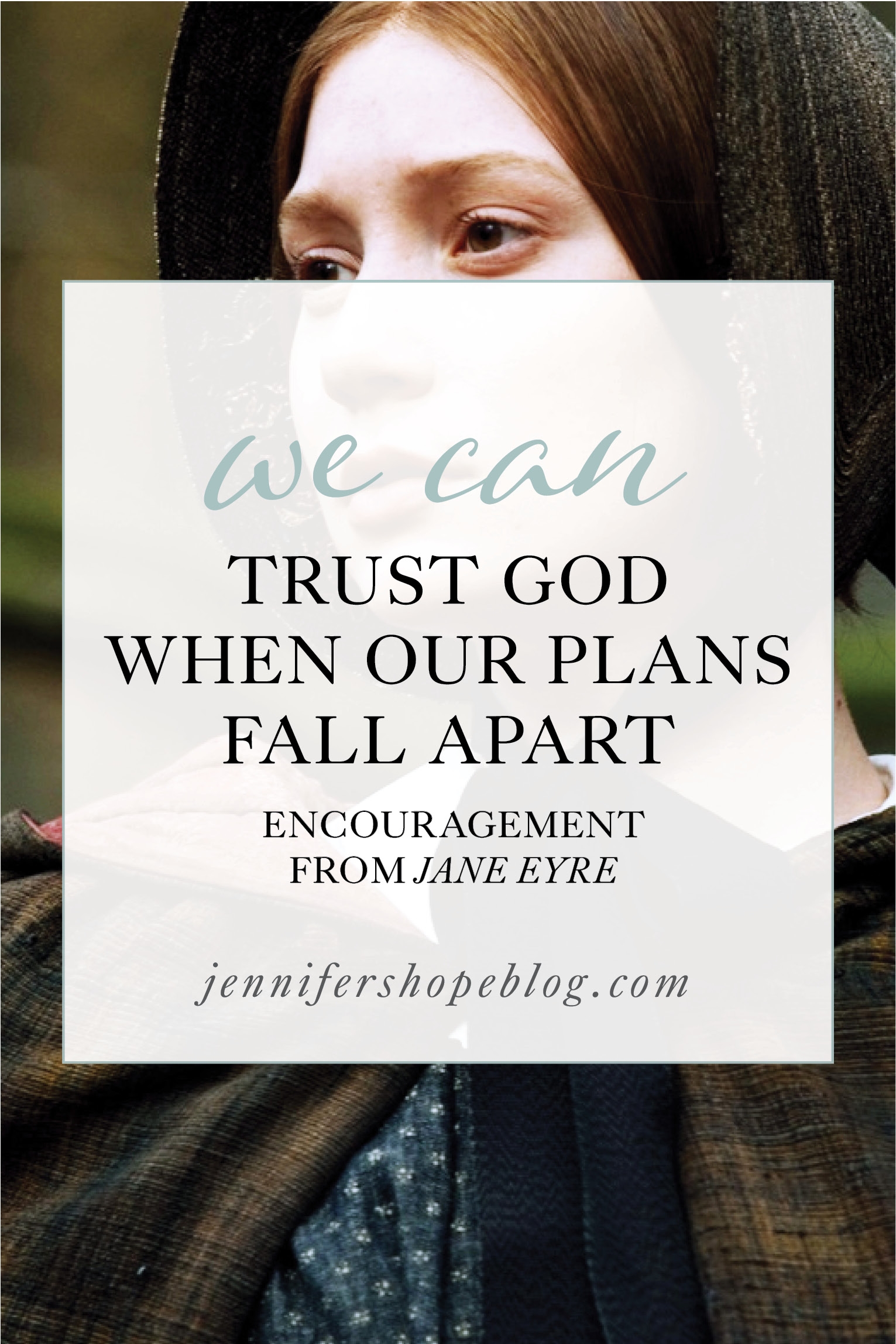
image via
As much as I love Jane Austen, I have to admit that Charlotte Bronte’s Jane Eyre is my most favorite of all the novels I’ve read.
The story of Jane Eyre is both touching and memorable. I first read the book in high school (more than a decade ago), and have seen the movie a number of times, but it wasn’t until I reread the novel as a 26-year-old that I realized how much of an faith-encourager this story truly is.
In my most recent reading of Jane Eyre this January, I was completely captivated. Perhaps it’s 10 years of life experience – 10 years of life, love and loss – that has made all the difference in how much it affected me. And, honestly, it was not because it is some great romance. I mean, it is a wonderful love story, but more than that it is a story of God’s faithfulness and how we can trust him when things fall apart. I really think that’s what Charlotte Bronte would want us to take away from the story – above all else.
If you aren’t acquainted with Jane Eyre, I want to you close out of this post, go read the book and come back in a few weeks when you’ve finished. I don’t want to spoil anything for you. But, if you are familiar with the story, then do grab yourself a cup of tea, keep scrolling and reminisce with me.
As much as I love the 2011 film adaptation with Mia Wasikowska and Michael Fassbender, it doesn’t do the novel a justice when it comes to portraying Jane’s faith. Other than the words, “God help me,” we don’t get a good glimpse into Jane’s heart and soul like we do in the book.
As you know, Jane Eyre is the story of an orphaned girl with an extremely difficult life. Throughout her childhood and adolescence, she never experiences what it’s like to have a family and to be loved. So, as you can imagine, when at 18 years old she is offered a marriage proposal by her employer, Mr. Edward Rochester – a man with whom she is completely infatuated – she is entirely overwhelmed and filled with joy. It seems like she is finally getting her “happily ever after,” doesn’t it?
But then a dark secret is uncovered. On Rochester and Jane’s almost-wedding-day, we learn that he already has a wife. Fifteen years prior, he was essentially tricked into marrying a woman he barely knew, and four years later she became mad. Instead of locking her up in an asylum, he did his best to care for her – keeping her in his home and having her cared for there.
Although it is impossible for Rochester to have a relationship with his wife because of her tantrums and episodes, the law did not allow for him to be legally separated from her either. So he became trapped in his own misery, and he began to search for a happiness that could not exist so long as he depended on himself. Nothing could make him happy – not his money, not his travels, not the three different lovers he took – no, nothing at all.
And then Jane comes along. To him, she is pure, she is sweet, she is like nothing he has ever known. So they fall in love, and he hides his secret, and he tries to marry her. And after the truth is revealed to Jane, she refuses to consent to his beckoning for her to stay with him and be his “wife,” virtually and nominally. Why does she do this? Because she knows living with a man – without being married to him – goes against the laws of God.
In a heated moment of temptation, with the love of her life pleading for her to stay, Jane says (to herself),
I will keep the law given by God, sanctioned by man. I will uphold to the principles received by me when I was sane, and not mad – as I am now. Laws and principles are not for the times when there is no temptation: they are for such moments as this, when body and soul rise in mutiny against their rigour; stringent are they; inviolate they shall be. If at my individual convenience I might break them, what would be their worth? They have a worth – so I have always believed; and if I cannot believe it now, it is because I am insane – quite insane: with my veins running fire, and my heart beating faster than I can count its throbs. Preconceived opinions, foregone determinations, are all I have at this hour to stand by: and there I plant my foot.
And so, with a broken heart and a heavy soul, she leaves Rochester, telling him to trust in God and that she hopes to see him in heaven.
This is so beautiful to me. Jane’s dependence on God in the midst of her world falling apart is incredibly inspiring. Would I have had the strength to do what she did? I cannot know. But I do know that, when my circumstances aren’t what I want them to be, I can trust in God just as Jane did.
You’ve heard me say this before, but the struggle is part of the story. Romans 8:28 is a verse you no doubt have heard before, but it tells us that “all things work together for good” for those who trust in God. And that is exactly what Jane did. She put her faith in God, even though it meant saying goodbye to the man she loved desperately. It was difficult, but it was rewarding because she could then live in the freedom of God’s promises, instead of running away with Rochester and a guilt that would have eventually caught up to her.
Jane and Rochester spend the next year apart, but she eventually returns to him because she feels compelled to see how he is getting on. When she meets him, she finds him quite altered. He has lost a hand and become blind, all due to a fire that his crazy-but-now-dead wife had started. After setting fire to their home, his wife committed suicide.
It turns out that Jane and Rochester’s separation was not a test of only Jane’s faith. It was a test of Rochester’s, too. Near the end of the book, he says,
Jane! You think me, I daresay, an irreligious dog: but my heart swells with gratitude to the beneficent God of this earth just now. He sees not as man sees, but far clearer: judges not as man judges, but far more wisely…
Divine justice pursued its course; disasters came thick on me: I was forced to pass through the valley of the shadow of death…
Of late, Jane, I began to see and acknowledge the hand of God in my doom. I began to experience remorse, repentance; the wish for reconcilement to my Maker.
In the end, Jane and Rochester marry. They have children, and he regains some of his eyesight. I am sure that their marriage was not like they had originally pictured, but it had to have been beautiful because it was how God planned it.
I think we all can benefit from reflecting on the story of Jane Eyre. I don’t know about you, but many things in my life have not gone as I had planned, but they DID go just as God had planned. And everything – every little thing – is for our good and for God’s glory. We can trust our faithful creator, even when it seems impossible.
Charlotte Bronte Jane Eyre trusting god





It has been a long time since i have read Jane Eyre, and i must have read it when i was very young because i don’t remember that her faith played such a big roll in how she responded to this difficult situation, I’m going to read it again now that I’m 28 and I’m sure it will mean so much more to me now. Thank you for your encouraging posts, I love to read your blog, and I appreciate that you try to point your readers to God and not themselves to find help in times of difficulty, may He bless you for serving Him and bringing Christ the glory with your words! 🙂
Thank you so much for your sweet comment, Kate! Yes, it’s amazing how God is written into that whole story. I too read it when i was very young, and as I reread it this January, I was shocked at how big of a role Jane’s faith played! I didn’t remember that. It’s so beautiful. Enjoy!!
Thank you for sharing your post! I was recently diagnosed with breast cancer at 33years old. I am a military wife and homeschool mom of 4. But I see God working it all for good. And He is being glorified in the pain. I am leaning into God as “the battle is not ours, but God’s.”
wwww.bellsandbluebonnets.com
Oh Carmen, Thank you for sharing! You are in my prayers! Checking out your blog tonight! <3